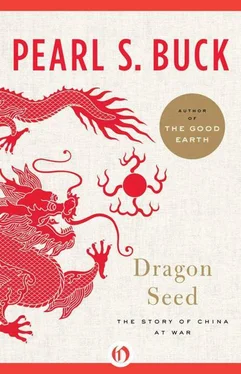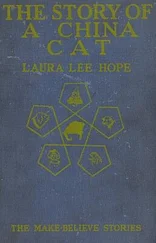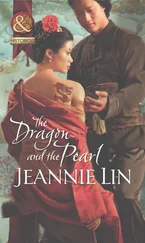THIS LING TAN WAS a man who lived his life both wide and deep, though he seldom stepped off his own land. He did not need to wander, since where he was there was enough. Thus under the skin of the land which he tilled as his fathers had before him there was the body of the earth. He did not, as some do, own only the surface of the earth. No, to his family and to him belonged the earth under their land, and upon this possession Ling Tan used often to ponder. What, he would ask himself in the long pleasant days of lonely plowing, or longer tilling against weeds among the young crops, what lay beneath this soft black skin of the earth in which were held the roots of his seedlings?
He had once in his youth dug a well for his father and for the first time he had seen what lay under their fields. First there was the deep thick crust of the earth, fertile and loose with the tilling of his forefathers and with their waste which they poured back into it year after year. This earth was so rich that almost it was quick enough to spring into life of its own accord. Fed for growing and nurtured for harvest, it lay hungry for seed as a woman is, eager to be about its business.
This earth he knew. But under it was a hard yellow bottom of clay, as tightly packed as the bottom of a pan. How did that yellow bottom come there? He did not know nor did his father, but there it lay to catch and hold the rain for the roots that needed it. And beneath that yellow clay was a bed of rock, not solid, but splintered and split into thin pieces, and between these was grayish sand. And under this bed was still another, strangest of all, for here were pieces of tile and scraps of blue pottery and when Ling Tan dug the well, he even found an old silver coin of a sort he had never seen before and then a broken white pottery bowl and at last a deep brown jar, glazed and whole and full of a gray dust. He had taken these things to his father, and father and son they had looked at them.
“These were used by those from whom we sprang,” his father had said. “Let us put them into the tombs with your grandparents.” So they had done, and then Ling Tan went on digging and out of those depths clear water spouted forth one morning like a fountain, and never to this day had the well failed.
Yet beneath that river, he used often to muse, this earth of his went on. Others had owned it and lived on it and had become part of it themselves, for it was a common saying of the old men in the village that if a man could dig deeply enough in his own land or any land, he would find, five times over, the roots and ruins of what had once been great cities and palaces and temples. Ling Tan’s own father’s father in his time had once dug deep for a grave for his father, and had found a small dragon, made of gold, such as might have fallen from the roof of an emperor’s palace, and he had sold it for enough to buy himself a little concubine he craved. Ill luck it was, too, so the story had come down from generation to generation, for that woman was evil and robbed his house of peace and goods and he was helpless whatever she did because he loved her and through this love they all but lost the very land they had, and would have lost it if his old wife, seeing what havoc was about to fall upon them, had not given the concubine timely poison. Even then it was evil enough, for the man, when his concubine was dead, killed himself, but at least the land was still his sons’ possession. But after that it was always told that the concubine was somehow faery and that the dragon was no true dragon but a fox spirit that had entered into the body of the pretty girl the man loved too well.
Whether all this was true or not, there the land was, and it went deep down beyond fountain and river and rock and as long as he lived it belonged to Ling Tan as far as it went down and to his sons after him.
The whole earth, he had heard, was round. This at least a young man had told who came preaching of many curious things to the village one summer’s day. He came, he said, to help the common people and to do them a good deed by what he called teaching, and because the people in the Ling village were courteous and kind they were willing to listen, especially as it was a feast season and they were not working. So they listened to tales of the roundness of the earth and to the wickedness of flies and the young man showed them pictures of flies as large as tigers, which he held up for them to see. The women cried out when they saw flies so big but Ling Tan told them afterwards to calm themselves, since it was only in foreign countries that flies were like that. Here they were small harmless things that a man could pinch between thumb and finger if he wished, but who cared whether they lived or not, since they had no sting and did no hurt?
That the whole earth was round he found it hard to believe, and he often thought of that young man, a good young man and doubtless a pilgrim of some religion, doing a penance for his soul by walking from one village to another preaching his knowledge. Thus when Ling Tan found among his melons a round one he would think, “That is as the earth is.” But what he could not comprehend was how, if the earth were round, men on the bottom side could walk. Yet when he talked of this in the tea shop one evening, his third cousin said that it could be true because he had heard that the people on the other side of the earth did all the opposite of what it should be done. Thus, he said, their children were born with white hair that grew dark as they grew older, and they pushed a saw away instead of pulled it to them, and they put cloth on the floor instead of on their beds, and all they did was reasonless and mad. So, he said, it might be true that they even walked with their heads hanging down and liked it.
Of such things Ling Tan mused as he tilled his earth and it moved him to laughter to think that somewhere very far below the spot where he stood his land went on and on until at last foreigners stood on it and doubtless planted seed on it and took their harvests from it as though it were their own.
“I ought to ask them for my rent,” he would think and grin until one of his sons seeing him grinning under his big bamboo hat called out to know why he was merry, and then Ling Tan said:
“I have just thought that on the bottom of this land of mine somewhere a foreigner reaps his grain without asking me and I could have the law on him if I knew how to tell him so.”
His little black eyes sparkled and his sons laughed with him. Not one of them had ever seen a foreigner close, though in the city there were some scores of them living peacefully and doing their business. Ling Tan had once asked a man who served in a foreign house and who had come into the country to search for fresh hen’s eggs if his master walked head down or up, and the man had said, up, as he did, and Ling Tan respected the foreigner the more for learning wisdom when he came here. But the foreigner on the other side of his land grew to be a joke in Ling Tan’s household, and if the soil grew dry he would pretend to grumble that the foreigner on the other side had drained it, or if his turnips came up smaller than they should, he said the foreigner was pulling at the roots. By this means all the household came to have a friendly merry feeling toward foreigners everywhere, though truly they knew none except in this merry fashion. And yet because of it, if a strange man had come to the house and said he was a foreigner, Ling Tan would have asked him to come in and sit down and drink tea and eat a meal with them.
But Ling Tan owned not only the earth as deep as it went beneath his feet but he owned the air above his land as far as it went up. The stars over his land were his stars and beyond them whatever there was was his. Of them he knew nothing for none could tell him of the heavens. To him the stars were a handful of lights, lanterns, jewels perhaps, toys and decorations, things for beauty rather than use, like a woman’s earrings. They did no harm and what their good was he did not know except that he was glad they were there, else the sky would have been too black above his head at night.
Читать дальше












